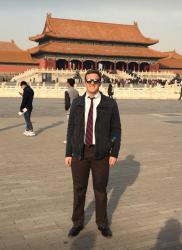In post-9/11 America, the Islamic faith appears to many to be incompatible with freedom. What we know of the Muslim world consists largely of oppressive terrorist groups ruling their own fiefdoms with an iron grip, stifling the free market and political liberty. However, in his Acton University lecture, entitled “Islam, Markets, and the Free Society,” Mustafa Akyol argued that this is not the whole story. During his talk, he took a deep dive into the history of the Islamic world, showing how Islam, when practiced correctly, actually stimulates capitalism and a free society.
Mustafa Akyol, a prolific Turkish journalist, author, and public speaker, elegantly outlined the Muslim case for a free society during his half-hour presentation. Beginning with the Quran itself and the words of the Prophet Muhammad, known as the hadith, he pointed to their clear textual emphasis on business. The Quran encourages trade, prohibits envy of the wealth of others, forbids fraud and theft, and explicitly protects private property rights.
Muhammad himself, before receiving the Quran, worked as a traveling merchant, and wrote many hadith praising merchants and honest business practices. Akyol also referenced other Islamic scholars, including one Imam Ghazali, who wrote of the internal and personal “jihad al-nafs” or “jihad of the soul,” and used the example of a war waged between an honest businessman and the devil who tries to convince him to cheat. Ibn Khaldun, an Islamic advocate of small government and lower taxes, wrote treatises approximating the economic ideas of Adam Smith a full 500 years before Smith was even born.
Akyol also emphasized the generally free nature of medieval Islamic society and religion, quoting economist Benedikt Koehler, who calls this era “the birth of capitalism.” Islamic society protected free economic activity, creativity, property, and freedom of worship to a far greater degree than European society at the time. Zakat, one of the five pillars of the Islamic faith, morally requires the wealthy to give alms to the poor without resorting to government intervention. The Islamic faith also includes the concept of Waqf, or foundation, a method protected under Islamic law of privately funding hospitals, schools, or other “public” services.
Akyol ended his remarks with a brief analysis of where things have gone wrong, highlighting the rise of Europe and the decline of Middle Eastern trade. He argued that this decline of trade helped lead to Islamic extremism, and that extremism does not represent what Islam can and should be. If we promote trade in the Islamic world, we can curb the extremist tendencies of al-Qaeda and ISIS and undermine their popularity with the local populations.
The audience at Acton University, especially fellow Muslims and American business leaders, quite visibly agreed with his arguments, and a lively question and answer session followed the lecture. Many questions focused on the economic effects of Islamist terrorism and the War on Terror, and on what we can do to improve the situation. In the closing moments of the session, Akyol succinctly stated his final conclusion with the phrase “make business, not war,” a truly admirable mantra for promoting a free and virtuous society in the Middle East.
Photo: Wikimedia Commons

